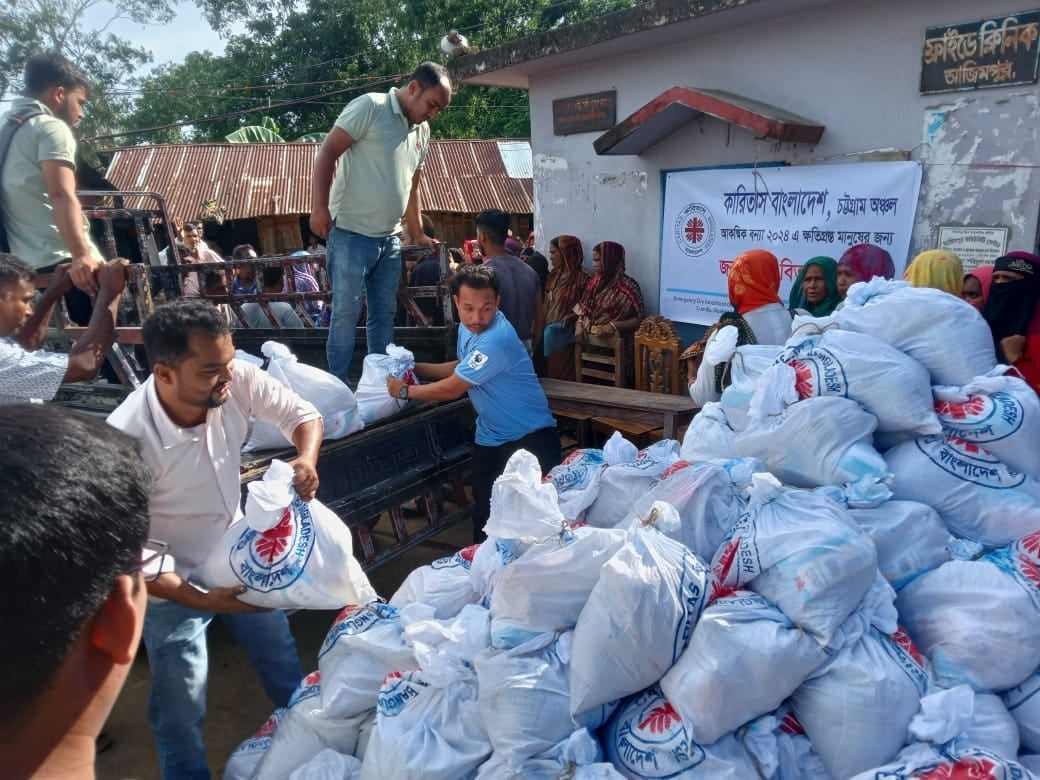Floods in Bangladesh: 52 victims, Christians in the front line of relief efforts
Over 5.4 million people affected, with more than a million families submerged. Many homes were destroyed, like that of Sumi Rani in Feni: ‘Everything we owned is gone. Despite the receding waters in some areas, the crisis remains in the south of the country. Christian organisations like Caritas Bangladesh and the government have initiated aid. Experts call for urgent measures against climate change.
Dhaka (AsiaNews) - Bangladesh is grappling with the consequences of the devastating floods that have affected an area inhabited by over 5.4 million people. At a press conference yesterday, the Assistant Secretary of the Ministry of Disaster Management and Relief, KM Ali Reza, reported that 1,072,579 families were submerged in water. So far, 3,403 shelters have been opened, accommodating over 500,000 people.
The death toll from the floods has risen to 52, including 39 men, six women and seven children. Among the worst affected districts are Feni, Comilla, Chittagong, Noakhali, Cox's Bazar, Khagrachari, Brahmanbaria, Laxmipur, Moulvibazar, Habiganj and Sylhet. In Feni alone, 17 deaths were reported, while in Comilla 14 and in Noakhali eight.
The story collected by AsiaNews of Sumi Rani, a Hindu woman in her seventies originally from Feni, is one of the many dramatic ones in these hours. When she returned to her home, Rani wept at the sight of the devastation.
The floods had severely damaged her house, leaving it in ruins. Although there is some water left, food is scarce. ‘There is no rice at home, no cooker to cook it. Our pets have been wiped out.
Everything we owned is gone,’ she says. Rani lived with four family members in a mud house with a thatched roof. When the floods hit Feni, her village was among the first to be swept away.
She and her family managed to find shelter in a nearby flood shelter, with the help of locals. Now that the waters have receded, she has returned, but has found her house uninhabitable. The floor is soft, sinking underfoot, only the roof and walls remain standing.
While the flood situation has improved in some upstream districts, others continue to suffer. In southern districts, such as Noakhali, Laxmipur and Chandpur, conditions remain dire. Heavy rains and high tides have also raised the water level in coastal districts like Bagerhat, aggravating the crisis.
As the waters recede, the extent of the destruction becomes clearer. Roads are impassable and many mud houses have been destroyed. For those who have sought shelter in shelters, returning home is still not an option and it is expected to be a long time before normalcy returns to the affected areas.
Christian organisations are at the forefront of the relief efforts, providing vital aid for the victims. However, the scale of the disaster requires continued support and solidarity from the global community.
The Ministry of Disaster Management and Relief has allocated 400 million taka (over 3 million euro), 20,650 tonnes of rice and 15,000 food packages as aid. Caritas Bangladesh actively supported the flood victims.
Officials reported that as of 28 August they have reached over 20,000 affected people and aim to assist more than 80mial people. Notre Dame College in Dhaka and the Bangladesh Catholic Student Movement (BCSM) have also launched initiatives to support those affected by the floods.
According to experts, although the flood waters have begun to recede, serious shortages of food and clean water persist. As a result, there has been a significant increase in diarrhoeal diseases and other gastrointestinal problems.
Respiratory conditions such as fever, colds, pneumonia and an increase in skin diseases have also been reported. Without appropriate intervention, these health problems could worsen.
Many experts believe that sufficient medical teams and volunteers are needed in the affected areas, as well as the establishment of adequate field hospitals.
The disaster underlines the need to intensify efforts to address the impacts of climate change. Permanent solutions to the problem of recurrent flooding must take priority.
This includes initiatives to make rivers more navigable, allowing upstream runoff and rainwater to flow more freely. Without these measures, Bangladesh could face similar floods every year.
Ainun Nishat, an expert on climate change and rivers, pointed out Bangladesh's lack of preparedness to deal with floods. ‘We should have acted when the heavy rains started around 16 August, especially in the eastern part,’ he said. ‘The Indian Meteorological Department's forecast predicted heavy rains, but nobody acted until it was too late.’
11/08/2017 20:05







.png)











